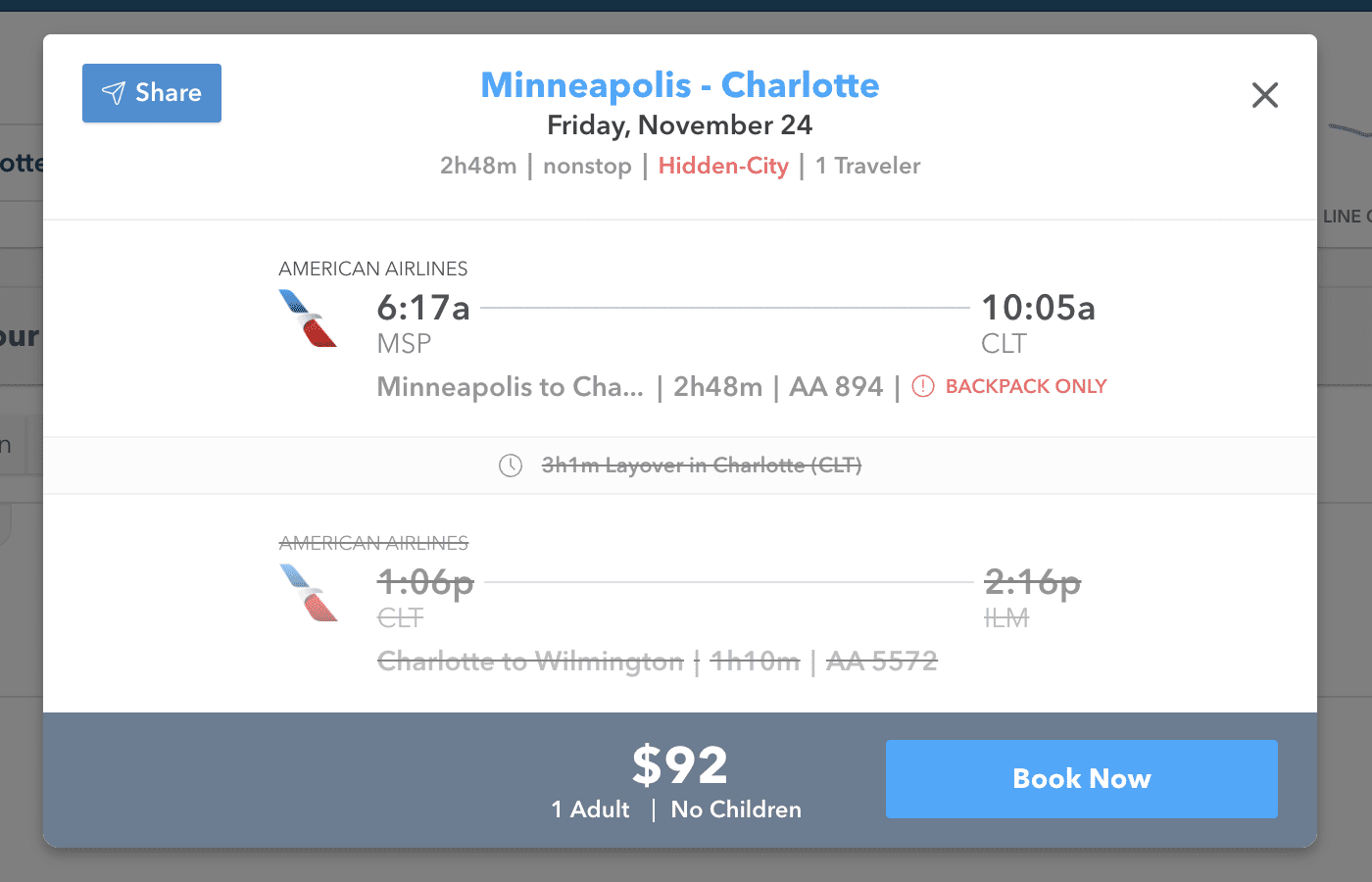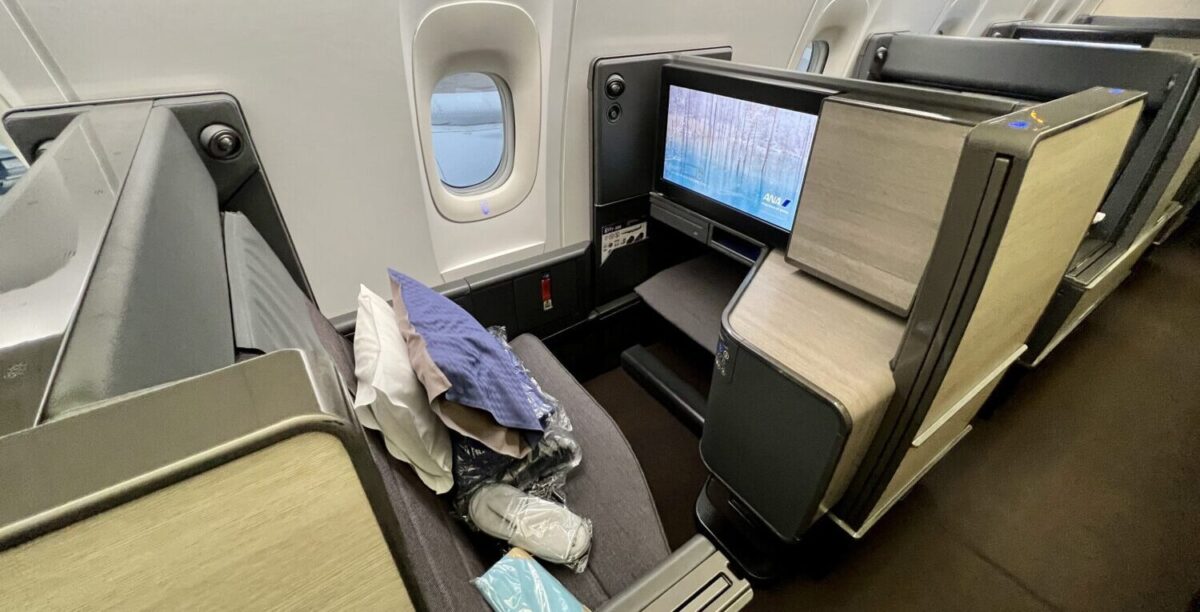American Airlines is the latest airline to sue Skiplagged, the travel website that sells travelers flights with a connection they never intend to take in order to save some money.
The Dallas-based airline filed its lawsuit against Skiplagged in Texas federal court late last week, alleging the website is deceiving customers and doesn't even have the authority to sell American tickets to passengers through its booking platform. American has also threatened to cancel any tickets booked with the airline through Skiplagged.
Skiplagging – also known as hidden-city or throwaway ticketing – has been around for a while, but Skiplagged helped popularize it. While not illegal, this potentially money-saving method violates airlines' own policies. Even Skiplagged itself warns against using this method often.
Let's say you want to fly from Minneapolis (MSP) to Charlotte (CLT) but the prices are high.

However, there's a cheaper flight from Minneapolis to Wilmington (ILM) with a stop in Charlotte for much less. By using hidden-city ticketing, you'd book this cheaper ticket with no intention of flying through to the final destination in Wilmington. Instead, you'd just get off in Charlotte and skip that second segment altogether.

Skiplagged automates the process of finding these potentially money-saving workarounds and even lets them book the ticket through their site.

Read our full guide on Skiplagged – and why it may not always save you money…
It may not be illegal, but that hasn't stopped airlines from trying to crack down. American Airlines is just the latest to head to the courts.
United and online travel agency Orbitz sued the website in 2014 for interfering with their operations and promoting “prohibited forms of travel,” the Associated Press reported. Skiplagged settled with Orbitz and the United lawsuit was tossed out due to lack of standing. Individual travelers have been sued, too, including a passenger sued by Lufthansa a few years ago for skipping the final leg of a flight.
More recently, American banned a teen from flying the airline for three years for these kinds of tickets. Airlines can also suspend your frequent flyer account and seize your miles – like United has threatened – or worse.
But now American itself is taking the website to court, too. In the lawsuit, American accuses Skiplagged of tricking customers into believing they are exploiting “some kind of secret ‘loophole'” by using the website. The airline says Skiplagged doesn't have – and has never had – the authority to sell American flights on its platform.
“Skiplagged deceives the public into believing that, even though it has no authority to form and issue a contract on American’s behalf, somehow it can still issue a completely valid ticket,” the lawsuit reads. “It cannot. Every ‘ticket' issued by Skiplagged is at risk of being invalidated.”
American also alleged Skiplagged will show customers a higher price than what they would find on American's own site or another third-party booking platform authorized to sell American flights, calling it a “classic bait and switch.” American accused Skiplagged of hiding its activity from the airline – and encouraging customers to do the same.
“Skiplagged does this by purchasing tickets on the AA.com website while pretending to be a consumer, in violation of the AA.com terms of use; by inducing agents of American to breach their agency agreements with American; and by misusing American’s trademarks to falsely imply that it is American’s authorized agent,” the lawsuit reads.
Skiplagged did not immediately respond to requests for comment. It touts its legal victory over United Airlines on its homepage, saying: “Our flights are so cheap, United sued us… but we won.”
Bottom Line
It's not the first airline to sue the website that popularized “skiplagging” – and it probably won't be the last.
American argues in its recent lawsuit that Skiplagged is deceiving customers, wrongly using its trademarks, and has no authority to sell its flights. Whether American is more successful than United and other websites that have sued in the past is up to the court.
It's just the latest reminder that while Skiplagged may have become a household name for employing a little-known method for saving on flights, there are plenty of complications to consider.





AA can f right off.
Trash airline.
Its the major airlines price gouging customers who live in their hubs thats caused this practice in the first place. If Delta charged a reasonable amount for a direct ticket to/from ATL and their hubs and American to CLT or DFW people rather then take advantage of their monopoly position at those airports, then ppl wouldn’t have to engage in these practices in the first place.
They abuse their valued customers by completely price gouging and insanely overcharging for direct flights to/from their hubs, and now they wanna call sour grapes when consumers find a perfectly legal loophole around their unfair practice.
The lawsuit sounds very finicky, its not illegal to take a flight and get off half way nor is it illegal for a search engine to show people these flights either. I’m not a lawyer but as far as I can tell the lawsuit has no merit. Probably they are suing in hopes if getting some leverage against the company and pressuring Skiplagged to remove American flights, but knowing skiplagged they won’t do it.
Also, the lawsuit makes it sound like they are trying to deceive the consumer but Skiplagged (and other sites like Kiwi.com) that engage in this practice make it very clear that its a hidden city ticket and explaining you can only bring a personal item. They also explain if you bring a carryon and it gets gate checked it may go to your final destination and there are no guarantees. They really aren’t hiding anything at all.
That being said from a consumer standpoint though I feel hidden city ticketing is not worth the risk and I personally would never do it, the flight can get rerouted, you can have your carryon bag end up gate checked, etc.
But if people want to take the risk, why not. I can’t imagine the airlines are really losing that much to this practice. The airlines going after these small companies could backfire by bringing government attention to their anti-consumer and unfair pricing strategy.